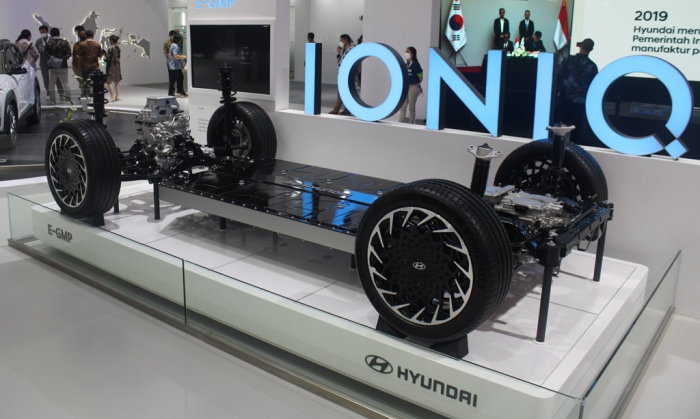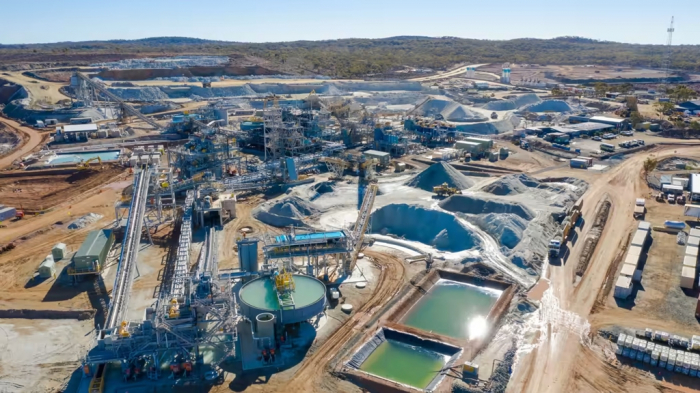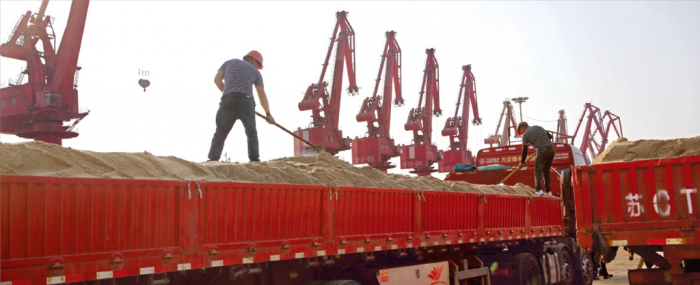Business & Politics
US DOE officials in Seoul to meet with Hyundai Motor, battery makers
Hyundai, which exports IONIQ 5 and EV6 cars, won’t get US subsidies until its Georgia plant is up and running from 2025
By Oct 13, 2022 (Gmt+09:00)
3
Min read
Most Read
LG Chem to sell water filter business to Glenwood PE for $692 million


KT&G eyes overseas M&A after rejecting activist fund's offer


Mirae Asset to be named Korea Post’s core real estate fund operator


StockX in merger talks with Naver’s online reseller Kream


Meritz backs half of ex-manager’s $210 mn hedge fund



US Department of Energy officials are in South Korea to discuss details of its electric vehicle and battery tax credit law with Korean government officials and executives from Hyundai Motor Co., battery makers and battery materials producers.
Working-level officials from the energy department on Wednesday met with senior officials from Hyundai, LG Energy Solution Ltd., Lotte Chemical Corp. and POSCO Chemical Co. at the US Embassy in Seoul, according to people with knowledge of the matter.
On Thursday, DOE officials visited the headquarters of two other Korean battery makers – Samsung SDI Co. and SK On Co. – to get their views on the Inflation Reduction Act (IRA) before setting detailed guidelines for the law, sources said.
US officials also met with their counterparts at Korea’s Ministry of Trade, Industry and Energy to discuss cooperation on clean energy.
One of the key purposes for US officials’ Seoul visit, sources said, is to jointly come up with ideas to address the issue of Hyundai Motor, which under the IRA rules will not receive US electric vehicle subsidies until 2025 when its new EV plant in the state of Georgia is slated to be up and running.

HYUNDAI SEEKS A REPRIEVE
The Korean carmaker has already asked the DOE to give it a reprieve until it completes the construction of its Georgia plant, according to the sources.
Georgia’s Savannah Economic Development Authority said Hyundai will break ground on its $5.5 billion EV manufacturing plant on Oct. 25. Given the cold weather in winter, actual construction work will begin early next year with an aim to start plant operations in 2025, officials said.
Under the IRA, signed into law by US President Joe Biden in August, Hyundai Motor Group’s electric cars are ineligible for a tax credit of up to $7,500 per unit as its main EVs, including the IONIQ 5 and the EV6, are currently manufactured in Korea and exported to the US.
As the IRA, aimed at diminishing China’s power in the global EV market, requires a certain percentage of critical minerals used in EV batteries to come from the US or its free trade partners, EV makers must use such batteries from next year to benefit from the tax breaks.
Qualifying EVs must contain at least 40% of the battery minerals and 50% of the battery components from those countries. The proportion will rise to 80% for minerals by 2027 and 100% for parts by 2029.

US, KOREA TO WORK OUT IRA DETAILS
Visiting US officials are meeting with Korean executives to work out details of the IRA rules as the law stipulates the proportion of US-made battery parts and raw materials in a broad framework, sources said.
Battery raw materials go through a complicated process in several stages before being made into battery cells, making it difficult to determine from which country the batteries came.
The IRA, as it is now, is unclear on whether an EV battery is eligible for tax breaks if lithium mined in Australia is processed by a Chinese smelter and made into a cathode material in a battery cell by a Korean company, industry watchers said.
While China is not the primary producer of battery materials such as cobalt, nickel and lithium, it is the primary processor of them.
China currently controls the processing of nearly 60% of the world’s lithium, 35% of its nickel and 65% of its cobalt, according to industry data.
Sources said the US government will likely announce detailed guidelines of the law after the November midterm elections.
Write to Hyung-Kyu Kim, Kyung-Min Kang and Ji-Hoon Lee at khk@hankyung.com
In-Soo Nam edited this article.
More to Read
-
 Electric vehiclesHyundai Mobis to spend $1.3 bn to build US EV parts, module plants
Electric vehiclesHyundai Mobis to spend $1.3 bn to build US EV parts, module plantsOct 06, 2022 (Gmt+09:00)
2 Min read -
 Electric vehiclesEV tax credits may prove detrimental to the US: EU official
Electric vehiclesEV tax credits may prove detrimental to the US: EU officialSep 22, 2022 (Gmt+09:00)
2 Min read -
 BatteriesFalling nickel prices: A boon for Korean battery makers over Chinese rivals
BatteriesFalling nickel prices: A boon for Korean battery makers over Chinese rivalsJun 21, 2022 (Gmt+09:00)
3 Min read -
 Electric vehiclesHyundai to invest $10.5 bn in US EV, future mobility sectors
Electric vehiclesHyundai to invest $10.5 bn in US EV, future mobility sectorsMay 22, 2022 (Gmt+09:00)
5 Min read -
 BatteriesChina’s tighter grip on minerals boosts costs for Korean battery makers
BatteriesChina’s tighter grip on minerals boosts costs for Korean battery makersApr 12, 2022 (Gmt+09:00)
4 Min read
Comment 0
LOG IN


